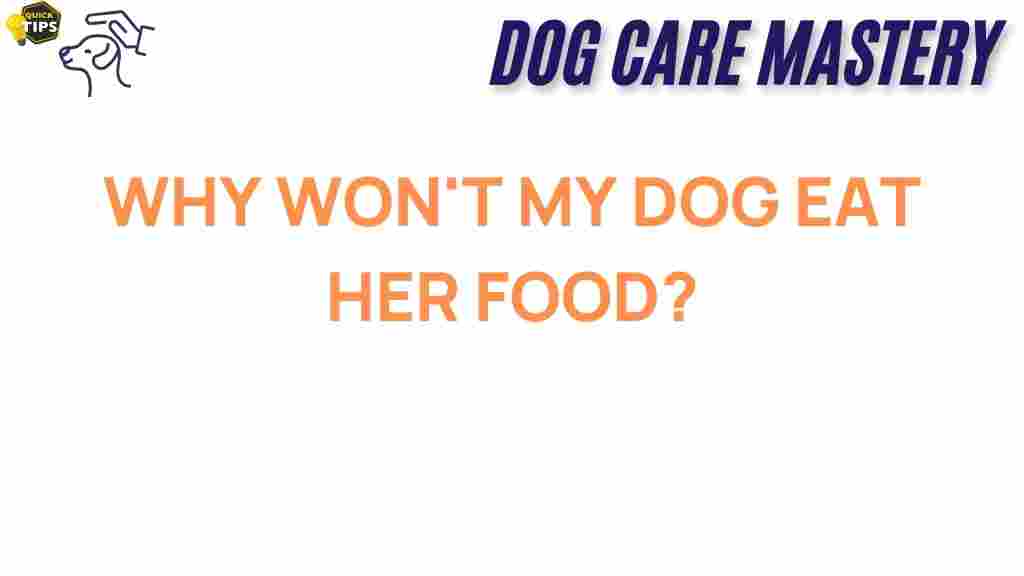Unraveling the Mystery: Why Won’t My Dog Eat Her Food?
As a dog owner, one of the most concerning issues you may face is when your beloved pet refuses to eat her food. A healthy dog appetite is essential for overall well-being, and a sudden loss of appetite can be alarming. In this comprehensive guide, we will explore the various reasons why your dog might not be eating, how to troubleshoot the issue, and when to seek professional help.
Understanding Dog Appetite
Before diving into potential reasons for a decreased appetite, it’s crucial to understand what a normal dog appetite looks like. Dogs, like humans, can have different eating habits based on factors such as age, breed, size, and activity level. Generally, healthy dogs will eat their meals with enthusiasm. However, fluctuations in appetite can occur and may not always indicate a serious problem.
Common Reasons for a Decreased Dog Appetite
When your dog isn’t eating, it can be frustrating. Understanding the causes can help you address the issue effectively. Here are some common reasons for a decline in your dog’s appetite:
- Health Issues: Illnesses such as infections, dental problems, or gastrointestinal issues can lead to a reduced desire to eat.
- Dietary Changes: Switching dog food brands or types can upset your dog’s stomach or taste preferences.
- Stress and Anxiety: Changes in the household, such as moving, new pets, or loud noises can impact your dog’s eating habits.
- Age: Older dogs may develop a decreased appetite due to health issues or changes in their metabolism.
- Medications: Some medications can suppress appetite as a side effect.
- Temperature: Hot weather can reduce appetite as dogs might eat less to avoid overheating.
Step-by-Step Process to Address Your Dog’s Appetite Issues
If your dog isn’t eating, follow this step-by-step process to identify the issue and take appropriate action:
- Monitor Your Dog’s Behavior: Observe any changes in behavior, such as lethargy, vomiting, or diarrhea. This can help you identify if the issue is health-related.
- Check the Food: Ensure that the food hasn’t expired and is stored properly. Dogs can be sensitive to stale or spoiled food.
- Assess Environment: Evaluate your dog’s environment for stressors. Have there been any changes in the household that could cause anxiety?
- Try Different Foods: Experiment with different types of food, including wet food or homemade meals, to entice your dog to eat.
- Establish a Routine: Create a feeding schedule to help your dog understand when it’s mealtime, which can encourage her to eat.
- Consult a Veterinarian: If your dog continues to refuse food for more than 24 hours, it’s essential to consult a veterinarian to rule out any health issues.
Troubleshooting Tips for a Healthy Dog Appetite
If you’ve gone through the step-by-step process and your dog is still reluctant to eat, consider the following troubleshooting tips:
- Check for Dental Problems: Bad breath, difficulty chewing, or bleeding gums can indicate dental issues. A vet visit can address these concerns.
- Ensure Fresh Water: Make sure your dog has access to clean, fresh water at all times. Dehydration can also affect appetite.
- Keep Feeding Areas Calm: Create a quiet, comfortable feeding environment to help your dog feel secure while eating.
- Limit Treats: If your dog is snacking on treats, she may not be hungry at mealtime. Consider reducing treats to encourage eating her regular food.
- Promote Exercise: Regular exercise can stimulate your dog’s appetite. Take her for daily walks or engage in playtime to boost her energy.
When to Seek Professional Help
It’s essential to recognize when to seek help from a veterinarian:
- If your dog has not eaten for more than 24 hours.
- If you notice any other concerning symptoms such as vomiting, diarrhea, or lethargy.
- If your dog shows signs of pain or discomfort.
- If there is a sudden change in appetite accompanied by weight loss.
Early intervention can be vital in addressing health issues, so don’t hesitate to reach out to your vet for advice.
Conclusion
Understanding your dog’s appetite is crucial for maintaining her health and well-being. While a decrease in appetite can be concerning, identifying the underlying cause can help you take appropriate steps to encourage her to eat. Remember to monitor her behavior, make necessary adjustments to her diet, and seek veterinary help when needed. By unraveling the mystery behind your dog’s eating habits, you can ensure that she stays happy and healthy.
If you want to learn more about dog care and nutrition, check out this comprehensive guide for tips and resources. For further information about pet health issues, visit the American Kennel Club website.
This article is in the category Behavior and created by dogcaremastery Team
